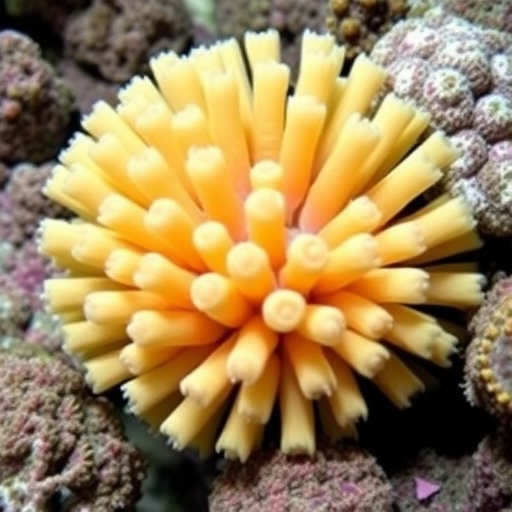In a striking revelation from the heart of the Caribbean, a concerning ecological shift has emerged, driven by the introduction of a new invasive soft coral species, Xenia umbellata. This invasive species has made its presence known in the coastal waters of southwest Puerto Rico, unveiling a complex narrative about marine ecosystems and the challenges they face in the wake of globalization. The findings spearheaded by researchers, particularly Toledo-Rodriguez, Veglia, and Marrero, present a clarion call to recognize the fragility of coral reef ecology amid changing environmental conditions.
The discovery of Xenia umbellata is particularly alarming as it threatens to disrupt the delicate balance of the local marine ecosystem. Coral reefs are not just beautiful underwater landscapes; they serve as critical habitats for a myriad of marine species and play an essential role in coastal protection and tourism. The introduction of a new invasive species poses significant risks, including competition for resources, alteration of local biodiversity, and potential disruption of food webs.
Research indicates that Xenia umbellata is capable of rapid proliferation, presenting a robust challenge for native coral species. This soft coral’s ability to thrive in a variety of environments allows it to outcompete local corals, leading to reduced biodiversity. Scientists are particularly concerned about the implications of such invasions on the resilience of coral reefs against climate change and other anthropogenic pressures.
Invasive species like Xenia umbellata often thrive in disturbed environments, where native species have been weakened by factors such as pollution, overfishing, and warming waters. The presence of this soft coral in southwest Puerto Rico is symptomatic of broader ecological challenges faced by Caribbean reefs. As seawater temperatures rise and other stressors accumulate, native corals struggle to survive, thereby creating opportunities for robust invaders. This phenomenon emphasizes the need for comprehensive management strategies that address not only the invasive species but also the underlying stressors affecting reef health.
The ecological ramifications of Xenia umbellata extend beyond mere competition. As this invasive coral spreads, it may influence the structure of entire ecosystems. Native fish species and invertebrates depend on specific coral varieties for shelter and food. If native corals decline in abundance because of invasive competition, the associated species that rely on them may also suffer from population declines. This interconnectivity illustrates the need for further research to understand ecological relationships in coral reefs and how invasive species may be influencing these critical dynamics.
It is vital for local and international conservation efforts to highlight the importance of early detection and rapid response in managing invasive species. The presence of Xenia umbellata underscores the critical role that scientists and conservationists play in monitoring reef health. By implementing strategies that target invasive species before they have a chance to establish and dominate, we can better preserve the intricate balance of marine ecosystems.
Public awareness campaigns are also essential in informing local communities about the potential threats posed by invasive species like Xenia umbellata. Education can empower residents to participate in reef conservation initiatives and advocate for the protection of their marine environments. Engaging the public through citizen science projects, beach clean-ups, and awareness programs can foster a culture of stewardship and care for coral reefs.
As researchers continue to explore the dynamics of Xenia umbellata and its implications for Caribbean coral reefs, interdisciplinary collaboration will be crucial. Understanding invasive species’ genetics, reproductive strategies, and environmental preferences will provide critical insights into their management. Coupled with local knowledge and global best practices, scientists can develop innovative solutions for mitigating the impact of invasive soft corals.
In addition to ecological concerns, the economic implications of invasive species must also be considered. Healthy coral reefs contribute significantly to local economies through fishing and tourism. The presence of invasive species could deter tourists seeking pristine underwater experiences and compromise local fisheries by degrading critical habitats. The cost of inaction could be steep, underscoring the urgency of action against Xenia umbellata.
The study of Xenia umbellata not only highlights the challenges of invasive species management but also stresses the interconnectedness of ecology and human activity. As the conditions of our planet change, it is imperative to adopt a holistic approach to conservation that incorporates social, economic, and scientific perspectives. The solutions to invasive species problems will not just lie in battling the invader but also in fixing the underlying vulnerabilities that allow invasives to thrive in the first place.
Ultimately, the discovery of Xenia umbellata in the Caribbean is a reminder that the health of our oceans is inextricably linked to our actions on land. As we face an increasingly interconnected world, where species can travel across borders with ease, it falls upon the global community to collaborate on effective strategies for managing invasive species. Embracing sustainable practices and prioritizing marine conservation will play an essential role in preserving the fragile beauty and biodiversity of our oceans.
In conclusion, the introduction of Xenia umbellata heralds a new chapter in the ongoing story of coral reefs and their preservation. As scientists delve deeper into understanding the implications of this invasive species, they illuminate the broader narrative of ecological resilience and the urgent need for proactive management. The Caribbean reefs, which are already vulnerable to the effects of climate change, must be safeguarded against further predation by invasive organisms that threaten their survival. Raising awareness and forging strategic partnerships will be vital in ensuring these ecosystems can withstand the pressures of our ever-changing world.
Subject of Research: Invasive Soft Coral Species in Caribbean Reefs
Article Title: Shadows over Caribbean reefs: occurrence of a new invasive soft coral species, Xenia umbellata, in southwest Puerto Rico.
Article References:
Toledo-Rodriguez, D.A., Veglia, A.J., Marrero, N.M.J. et al. Shadows over Caribbean reefs: occurrence of a new invasive soft coral species, Xenia umbellata, in southwest Puerto Rico. Coral Reefs 44, 1439–1444 (2025). https://doi.org/10.1007/s00338-025-02670-5
Image Credits: AI Generated
DOI: https://doi.org/10.1007/s00338-025-02670-5
Keywords: Invasive species, Caribbean reefs, soft coral, biodiversity, ecological impact, conservation strategies.




